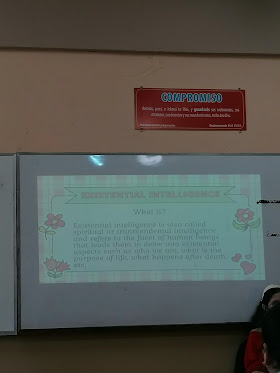Hi everyone, this week we had our presentations, many groups talked about multiple intelligences, let's see what they did!!
1. Verbal-Linguistic Intelligence by Regina's group
Basically, this intelligence teaches us the art of speaking and expressing ourselves well, some of the characteristics of this intelligence are:
-speaking skills
-persuasive
-Likes to read and write
Some of the activities that can be implemented to improve this intelligence are: participating in debates, discussions, reading more, among others.
Speaking of this, for the classroom activity, a small debate was organized to elect a student president, we joined in groups and then voted, the winner was our classmate Stefany.
2. Logical-Mathematical Intelligence by Fatima's group
This, as its name implies, is the intelligence that easily understands and analyzes mathematical concepts. Some of the characteristics persons with this intelligence possess are
-They use critical thinking to solve problems
-They like analogies
-They look for patterns and relationships between objects
Among the activities that people with this intelligence develop are puzzles, problem solving, questions and answers, among others.
Class exercise we did:
3. Musical Intelligence- by Alejandra's group
Basically, this one is the ability to compose, learn, and perform musical patterns. It involves sensitivity to sounds and vibrations. People with high musical intelligence understand and express themselves through music. They can produce and appreciate music, identify distinct musical notes, and may think in rhythms or melodies.
Some of the characteristics are:
-Appreciating musically
-Composing and writing music
-Playing musical instruments, among others.
They also talked about the job opportunities
from music teacher, singer, songwriter to music producer, etc.
The activity we played was (guess the song and find the right element)
Last but not least, my group that presented on Thursday 11!!
4- Visual-Spatial Intelligence
Is the ability to form a mental model of a spatial world and to maneuver and operate using this model. It is the sensitivity that a person can have to color, lines, shapes, space, and relationships between these elements.
We also have:
Some activities you can do as a person with visual-spatial intelligence:
-Play Pictionary.
-Works with puzzles and Rubik’s cube
-Build 3D structures with Legos, Minecraft, or 3D construction objects.
As a class activity, we did not one but 4 activities, the first one was reading a story and then answering questions, then a memory game, then a tangram puzzle and finally a pictionary, we also gave prizes!
I think that's pretty much all, thank you, pals, take care!!
Me and my group!!❤











































